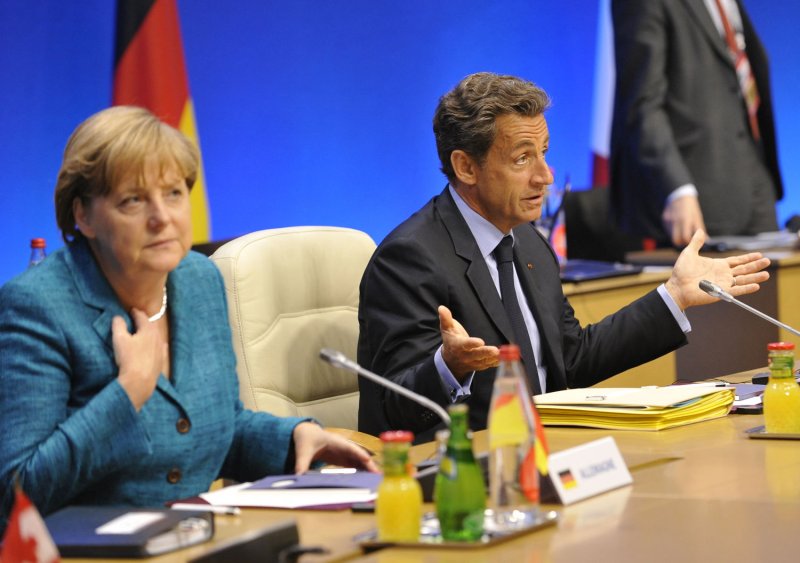French President Nicolas Sarkozy (R) and German Chancellor Angela Merkel attend a round table meeting at the G8 Summit in Deauville, France, May 26, 2011. UPI |
License Photo
STUTTGART, Germany, Oct. 10 (UPI) -- It has taken a while but the real problem of the euro is just starting to command the attention of Europe's leaders. And so far no one, not even the Germans who first began to articulate it, can see a solution.
It is this: Even if Europe's banks are fixed and even if Greece is bailed out and the markets are intimidated by a great wall of euros into backing away from speculation against Italy, Spain and France, the euro crisis won't go away.
No financial engineering can be more than a short-term fix. No new European treaty, however clear and rigid its rules over sovereign debts and budget deficits, can address the underlying problem.
Until Greeks and Spaniards and Italians start working as well as Germans, the problem is going to return. It is as simple as that.
Over the past decade, the unit cost of labor -- that is the share of wages in the cost of producing a given amount of national output -- has dropped in Germany by about 10 percent in relation to its euro partners. Germans goods have always been high-quality but this fall in the unit price of labor means that they are also cheaper.
The result has been that Germany routinely runs a trade surplus of some $270 billion a year with its eurozone partners. To pay for that German surplus, the other eurozone countries either have to start generating trade surpluses with other countries or they go into debt to pay for the German goods.
So unless the Greeks can find a way to start running a fat trade surplus with China or Brazil or the United States (and the Greeks don't produce much of anything the world wants to buy except beaches, sun and archaeology), they will soon start going into debt with German banks all over again -- if the German banks are dumb enough to lend them the money.
This is the euro's core problem. A handful of countries, mainly Germany, Austria, Finland and the Netherlands, are competitive in global markets. Most of the rest aren't. Their wages are too high, their welfare states too generous and their products too unattractive for the big leagues. And as long as they are trapped in the euro there is now way out.
It used to be simple before the euro. Countries with their own currencies could devalue, making their exports cheaper to foreigners and making imports too expensive to buy. Italy devalued on a regular basis and prospered. It worked the other way, as well. Germany regularly saw the value of its deutschemark rise on world markets, which allowed German living standards to rise and forced German manufacturers and workers to become highly efficient so that German quality made up for the higher prices of German exports.
So long as the euro locks Greeks and Spaniards and Italians into the same currency as the Germans, then these poorer countries either force down wages and living standards in order to become competitive or they will inexorably drift back into the same crisis of debt that afflicts them today.
This is why the Germans have been stressing that any new bailout for the euro must be linked to structural changes in the economies of the indebted countries. Structural change means the countries have to become more efficient in production, more ruthless in cutting wages and trimming excess jobs and less generous in welfare and pensions and public health.
That is the real curse of the euro. Unless the Germans become less competitive (as they threatened to do in the 1990s until Chancellor Gerhard Schroeder began cutting the welfare state) then the rest of Europe has to become like the Germans. Short of mass genetic engineering, it isn't easy to see how this will be done.
One possible way would be Europe to start running a common economic policy, with common labor laws, a common age for retirement and iron-clad rules to limit debt and budget deficits. That is what Europeans mean when they call for greater European integration and political union.
That is why the Big Three employers' associations, BDO in Germany, Medef in France and Confindustria in Italy, issued a joint call last week for a new treaty "as a step forward toward a closer political and economic union." Pledging their "full engagement in favor of deeper European integration," the Big Three stressed that European businesses had "the greatest interest in preserving the euro, as well as in supporting continued progress toward further political and economic integration."
So the key to Sunday's summit between German Chancellor Angela Merkel and French President Nicolas Sarkozy was that the Frenchman wanted a pledge of German cash to provide a short-term fix for the current crisis (and for France's wilting banks). By contrast, Merkel wanted dramatic structural changes in the rest of the eurozone.
Promises of structural reform have been made by the Europeans before and only the Germans have really kept them. So whatever new fixes the Europeans make over the coming weeks to keep the show on the road and however much money the Germans deploy to save the euro, this crisis won't really be over until the unit cost of labor in Greece and Italy drops toward German levels.
It may not be impossible for Greeks and Italians to turn into Germans and for people raised on a sunshine, wine and olive oil culture to become as efficient as their northern partners raised on rain, beer and butter. But don't hold your breath.















